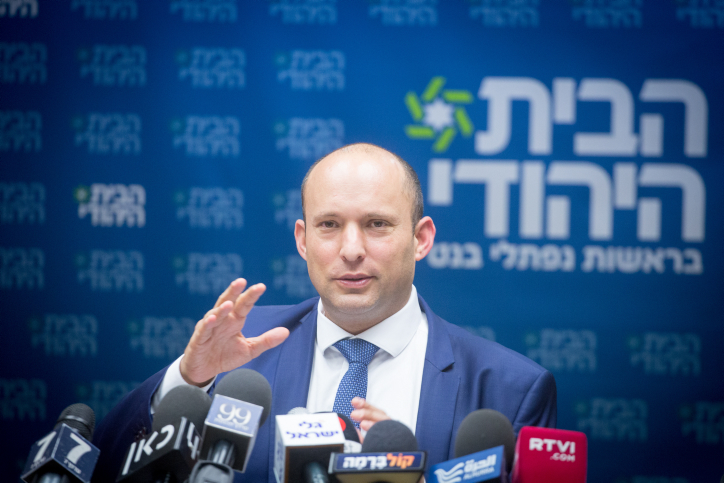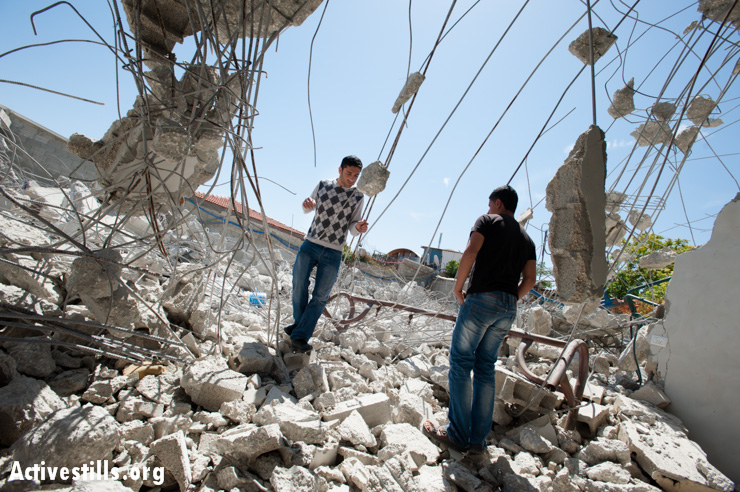Naftali Bennett cancelled an event with Israel’s oldest human rights organization after a group of bereaved families called it ‘one of the most extreme de-legitimization organizations against the State of Israel.’

On Tuesday, November 28, Education Minister Naftali Bennett canceled an upcoming joint event between his ministry and the Association for Civil Rights in Israel (ACRI) on workers’ rights. According to Ynet, the event was scheduled to take place on Wednesday to mark the International Day of Human Rights.
Bennett reportedly cancelled the event after receiving a letter from a group of bereaved families — working in conjunction with the far-right organization Im Tirtzu — who called ACRI “one of the most extreme de-legitimization organizations that in its activities against the State of Israel also hurts us, the bereaved families, directly.”
ACRI, founded in 1972, is Israel’s equivalent of the ACLU, and is the oldest and largest human rights organization in the country.
Bennett’s office told Ynet that ACRI’s activities “in support of terrorists stands in total contradiction to the most important values that the education system stands for.”
Among ACRI’s wide-ranging advocacy activities, the organization has petitioned the Israeli Supreme Court on the behalf of the families of Palestinians involved in terrorist activities to prevent the demolition of their homes by Israeli authorities. Many human rights organizations consider Israel’s practice of punitive home demolitions against the families of individuals involved in terrorist attacks a violation of international humanitarian law.
In response to the cancelation, ACRI issued the following response:
Our professional partnership with the Education Ministry has lasted 40 years with every education minister. ACRI expresses an even deeper concern from the fact that the current education minister views his role as carrying out the dictates of the extremist group Im Tirzu, which cynically exploits the pain of bereaved families. The decision smells of delegitimization and persecution of civil society organizations.

The cancellation comes just a week after top government ministers, including Justice Minister Ayelet Shaked and Deputy Foreign Minister Tzipi Hotovely, targeted Israeli anti-occupation group Breaking the Silence after its spokesman, Dean Issacharoff, was recorded admitting that he beat a Palestinian detainee while a soldier in Hebron. In an unprecedented use of the legal system to attack a political opponent, Shaked issued all-but-explicit directions to the state’s attorney to find Issacharoff a liar. The state’s attorney case later collapsed once it was revealed that it had failed to interview a number of witnesses — and that it had questioned the wrong Palestinian. Hotovely, appearing alongside Breaking the Silence Executive Director Avner Gvryahu on the Israeli equivalent of Meet the Press, told Gvaryahu, “You are all traitors.”
The attacks on established human rights organizations such as ACRI and Breaking the Silence are part of the Right’s campaign of incitement against Israeli civil society. One of the most common rhetorical weapons used against human rights groups is the accusation that they receive funding from foreign governments. Mattan Peleg, chairman of the far-right Im Tirzu group, who aided the bereaved families in writing their letter to Bennett, told Ynet that ACRI works “to promote the rights of terrorists in court with funding from foreign funding.”
Last year, the Knessett passed the controversial “Transparency Bill,” which dramatically increased the requirements for reporting foreign funding received by Israeli NGOs. More recently, Likud MK Yariv Levin, under instructions from Prime Minister Netanyahu, is said to be drafting a new bill that will enable the government to shut down NGOs that criticize the IDF or advocate boycotts of Israel. Israeli human rights groups fear that the bill’s wide applicability may threaten their ability to operate.

